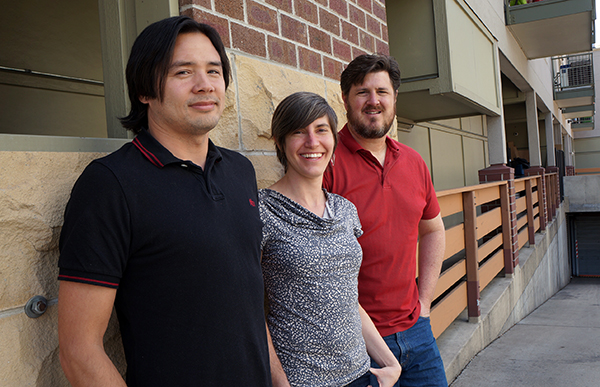A Denver software company that aims to make it easier for people to find, fund and license scientific research has raised $1.1 million to fine-tune its database.
Covalent Data, which makes a database for grant makers and corporations, said it could grow from four people to a dozen by the end of 2016.
Covalent aims to make it easier to compare research around a given topic by stitching together data from patent offices, SEC filings and grant making institutions, said CEO Tim Oliver.
“All of this data has rested in silos all around, so if you’re a company looking for the next technology you want to license, it’s very hard to find,” he said.
Founded under the name Collective IP by a group of University of Colorado Boulder students in 2012, Covalent started by uploading data from university technology-transfer offices, the departments tasked with getting research funded and technology licensed. It now has 300 such offices in the database, Oliver said.
Next, the company started signing paid subscribers. Private and public grant makers can search Covalent for free to see if research they have supported has been licensed or to seek new grantees, Oliver said. For-profit corporations pay for access; the company is not releasing pricing information.
“Last year was about proving that people will pay a substantial amount for this, going through a cycle of renewals and having people successfully renew,” he said.
The next stage is getting researchers onboard. Covalent builds researcher profiles by scraping data from several sources and then displaying a researcher’s experience, including published work and licensable patents, on one page. But now, Covalent wants researchers to customize their bios as they would on LinkedIn.
That’s one reason why Covalent is hiring data scientists, Oliver said: to make sure the database distinguishes between Jane Doe at Colorado School of Mines and Jane Doe at CU-Boulder, for example.
Then, Covalent can invite both Jane Doe’s to sign up through their university technology-transfer offices, check that their profiles are accurate, amend them and add more details about their work experience.
Covalent also is hiring front-end and full-stack software developers this year, Oliver said, and plans to add sales and marketing personnel by year-end.
The company has an office in Creative Density Coworking at 1719 Emerson St. It has disclosed raising about $4.7 million in filings with the SEC since 2012.
A Denver software company that aims to make it easier for people to find, fund and license scientific research has raised $1.1 million to fine-tune its database.
Covalent Data, which makes a database for grant makers and corporations, said it could grow from four people to a dozen by the end of 2016.
Covalent aims to make it easier to compare research around a given topic by stitching together data from patent offices, SEC filings and grant making institutions, said CEO Tim Oliver.
“All of this data has rested in silos all around, so if you’re a company looking for the next technology you want to license, it’s very hard to find,” he said.
Founded under the name Collective IP by a group of University of Colorado Boulder students in 2012, Covalent started by uploading data from university technology-transfer offices, the departments tasked with getting research funded and technology licensed. It now has 300 such offices in the database, Oliver said.
Next, the company started signing paid subscribers. Private and public grant makers can search Covalent for free to see if research they have supported has been licensed or to seek new grantees, Oliver said. For-profit corporations pay for access; the company is not releasing pricing information.
“Last year was about proving that people will pay a substantial amount for this, going through a cycle of renewals and having people successfully renew,” he said.
The next stage is getting researchers onboard. Covalent builds researcher profiles by scraping data from several sources and then displaying a researcher’s experience, including published work and licensable patents, on one page. But now, Covalent wants researchers to customize their bios as they would on LinkedIn.
That’s one reason why Covalent is hiring data scientists, Oliver said: to make sure the database distinguishes between Jane Doe at Colorado School of Mines and Jane Doe at CU-Boulder, for example.
Then, Covalent can invite both Jane Doe’s to sign up through their university technology-transfer offices, check that their profiles are accurate, amend them and add more details about their work experience.
Covalent also is hiring front-end and full-stack software developers this year, Oliver said, and plans to add sales and marketing personnel by year-end.
The company has an office in Creative Density Coworking at 1719 Emerson St. It has disclosed raising about $4.7 million in filings with the SEC since 2012.


Leave a Reply